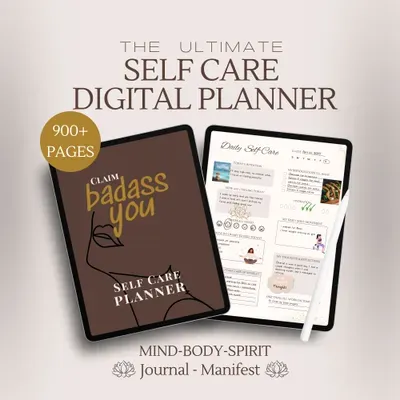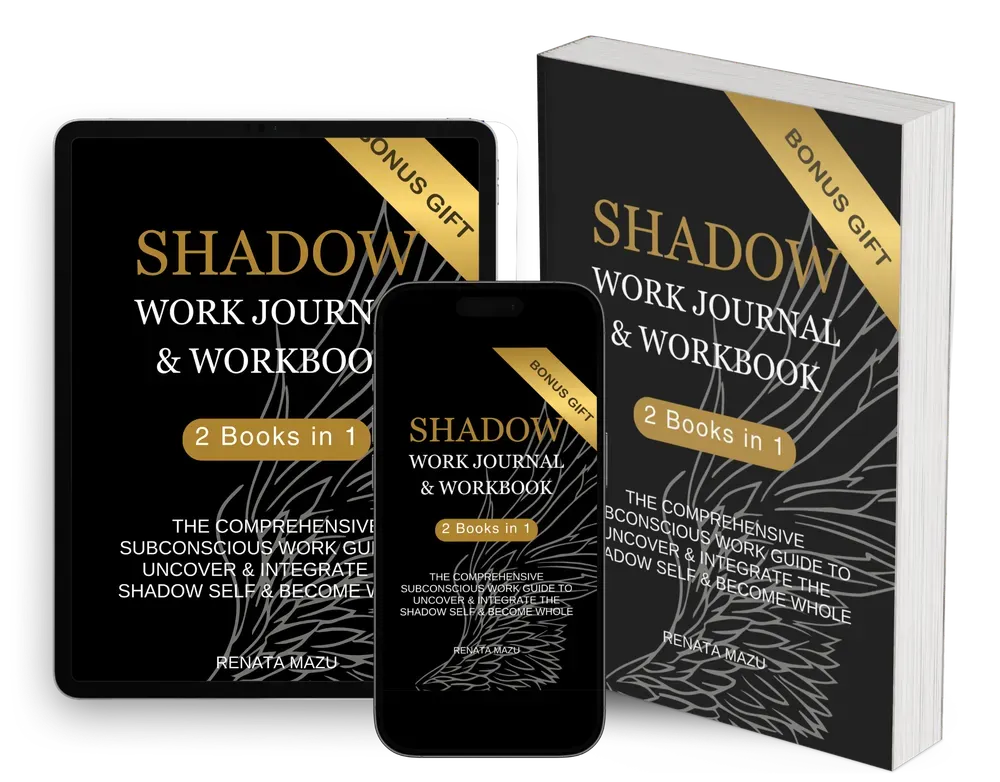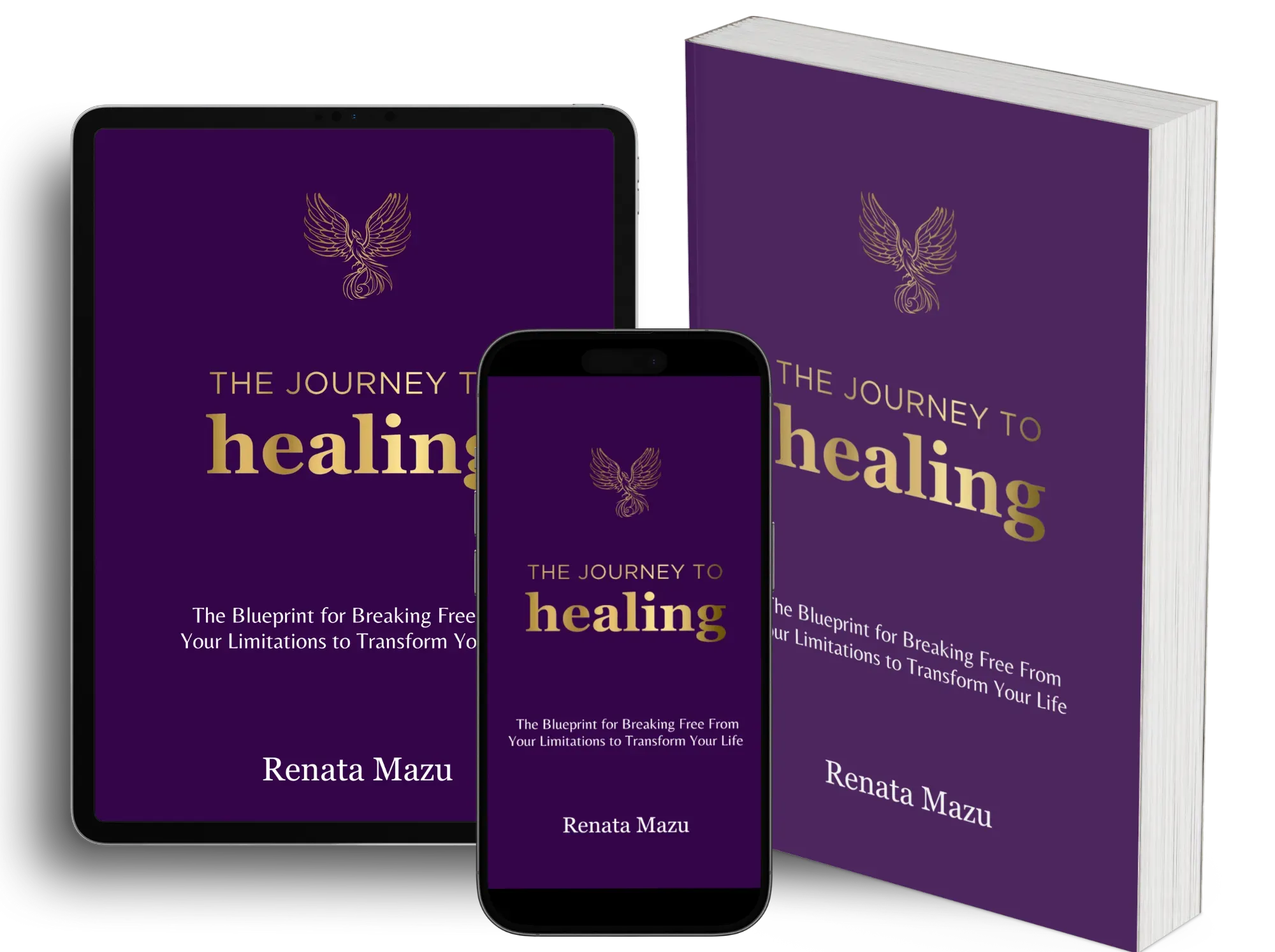
Discover - Let Go - Heal - Manifest
Welcome! Let's dive into personal growth and development, drawing parallels to navigating uncharted terrain where each step forward leads towards self-realization. With an emphasis on the importance of personal growth, you'll discover diverse topics and fundamental concepts such as self-improvement, self-awareness, and self-acceptance, alongside discussions, resources and tools on overcoming challenges like imposter syndrome, trauma, or low self-esteem. We'll explore emotional intelligence, fostering a positive mindset, and embracing growth-oriented perspectives as well as managing stress, cultivating resilience, and practicing forgiveness.
Here you'll find practical tools for personal growth, including goal setting, finding motivation, shadow work, inner child healing, and gratitude practices. It won't end there as you'll also find practical steps to manifesting your desires, encompassing the law of attraction, visualization, and affirmations. Whatever it needed for a personal transformation and growth, it's all here so you can enjoy your journey self-discovery and growth.
Shadow Work Journal & Workbook & Worksheets
Unlock the Power of Shadow Work to Heal and Transform Your Life
BONUS GIFTS:
🎁 1. "Miracle Activator - mini" - a mini course with 4 specific steps to eliminate your biggest mental barriers & challenges that prevent you from getting what you want, how to STOP feeling broken and stuck, procrastinating and self-doubting.
🎁 2. Download - "21 Ways to Raise Your Vibration Fast"
🎁 3. A powerful grounding meditation to start your day and stay grounded no matter what.
The Journey to Healing
This NEW BOOK Reveals the Blueprint for Breaking Free From Your Limitations to Transform Your Life and Career
In this book you'll find all it one place - how to identify what's not working in your life, your patterns, fears, limitations, how to break them, and start creating the new one so you can start attracting and living the life you desire.
No fluff, just proven information, prompts, and tools to take control of your mind and your life.
Mastery of the Self: Unlocking the Secrets to Personal Growth
Welcome! Let's dive into personal growth and development, drawing parallels to navigating uncharted terrain where each step forward leads towards self-realization. With an emphasis on the importance of personal growth, you'll discover diverse topics and fundamental concepts such as self-improvement, self-awareness, and self-acceptance, alongside discussions, resources and tools on overcoming challenges like imposter syndrome, trauma, or low self-esteem. We'll explore emotional intelligence, fostering a positive mindset, and embracing growth-oriented perspectives as well as managing stress, cultivating resilience, and practicing forgiveness.
Here you'll find practical tools for personal growth, including goal setting, finding motivation, shadow work, inner child healing, and gratitude practices. It won't end there as you'll also find practical steps to manifesting your desires, encompassing the law of attraction, visualization, and affirmations. Whatever it needed for a personal transformation and growth, it's all here so you can enjoy your journey self-discovery and growth.
Welcome to this journey of self-discovery and personal growth. In a world that’s constantly changing, it’s important for us to keep evolving too. Personal growth and development isn’t just about reaching new heights in our careers or mastering new skills, it’s about becoming the best version of ourselves. It’s about understanding who we are, what we want, and how we can achieve it.
In this comprehensive guide, we’ll explore various facets of personal growth and development. From understanding our emotions and mindset, overcoming challenges like anxiety and stress, to using tools like goal setting and journaling for personal growth. We’ll delve into the power of positive thinking, the importance of self-care, and even touch upon the intriguing world of money psychology.
So, buckle up and get ready for an enlightening journey of self-improvement, self-love, and self-discovery. Let’s dive in!
Self-Improvement - The Journey of Personal Growth
Self-Awareness - The Importance of Knowing Oneself
Self-Discovery - Unearthing Your Hidden Potential
Self-Acceptance and Self-Worth - Embracing and Valuing Oneself
Self-Care and Self-Love - Prioritizing Oneself
Imposter Syndrome - Overcoming Self-Doubt
Understanding Emotional Intelligence
The Power of Positive Thinking and a Positive Mindset
Growth Mindset vs Fixed Mindset
Change Mindset - Adapting to Change for Growth
Emotions and Their Role
Overcoming Challenges - Dealing with Anxiety and Stress
Building Resilience and Confidence
Increasing Self-Esteem
Forgiveness - Letting Go of the Past
Trust Yourself - Believing in Your Abilities
Goal Setting - Defining The Path
Finding Motivation - Fuel for the Journey
Gratitude - Appreciating What You Have
Vision Board - Visualizing The Goals
Journaling and Writing Therapy - Expressing Oneself
Shadow Work and Inner Child Healing - Healing from Within
Manifesting Desires - Understanding the Law of Attraction
Manifesting - Turning Dreams Into Reality
Affirmations – Accelerate Manifestations
Self-Improvement - The Journey of Personal Growth
Starting the journey of personal growth is like setting foot on an expedition through unfamiliar landscapes, where each stride forward leads us nearer to the pinnacle of self-discovery. Though the climb may entail hurdles and trials, the breathtaking view from the summit renders the meaningful journey.
Personal growth isn't about chasing an unattainable ideal of perfection; rather, it's a continuous pursuit of progress and development. It involves embracing our strengths and leveraging them to our advantage, while also acknowledging our weaknesses and actively working to overcome them. Stepping beyond our comfort zones, we challenge ourselves to expand our horizons, acquire new skills, and evolve as individuals.
At its core, personal growth is driven by a deep-seated desire to enhance various aspects of our lives, whether it's our professional skills, knowledge, health, relationships, or overall well-being. Setting clear, achievable goals serves as our compass, guiding us forward on our journey of self-improvement.
Persistence is a cornerstone of personal growth. It entails staying steadfast in our pursuit of growth, even when faced with setbacks or obstacles. While progress may unfold gradually, maintaining momentum ensures that we continue to advance along the path of self-discovery and transformation.
It's important to recognize that personal growth is a highly individualized process, shaped by our unique experiences, aspirations, and circumstances. Rather than comparing ourselves to others, the focus should be on nurturing our own potential and becoming the best version of ourselves.
Self-Awareness - The Importance of Knowing Oneself
Understanding ourselves is key to personal growth. Self-awareness means knowing our own feelings, thoughts, and motivations. It's like looking inwards, getting to know ourselves better, and understanding how we see ourselves.
When it comes to growing as a person, self-awareness is where it all begins. It's about recognizing our strengths and also areas where we can do better. Understanding what makes us tick, what inspires us, and what might be holding us back is all part of it.
Being self-aware also means understanding how others see us and how our actions impact those around us. It's about realizing our role in the world and taking responsibility for what we do.
But it's not just about how others see us; self-awareness also involves knowing what we truly value. It's about living in a way that aligns with our beliefs and being true to ourselves.
In simple terms, self-awareness sets the stage for personal growth. It's where we start to figure ourselves out and begin the journey of becoming better versions of ourselves. Let's keep exploring this path together.
ClaimBadassYou Journal with Affirmations & Shadow Work Prompts and Exercises
PAPERBACK Journal For Women: Unleash The Power Within, Release Self-Doubt & Become A Conscious Creator Of Your Life. 50 Affirmations - 200 Unique Prompts.
This self discovery and shadow work journal will help you step into higher vibration, express gratitude and appreciation, move towards and focus on your desires, and reinforce your efforts and actions so you manifest the life you want.
Self-Discovery - Unearthing Your Hidden Potential
Discovering who we are is like embarking on a journey deep into our own hearts. It's about delving into the core of our being and uncovering the treasures hidden within. This journey of self-discovery reveals our true potential and what makes us special.
In the realm of personal growth, self-discovery means recognizing our passions, interests, and talents. It's about finding joy in what we do, nurturing our curiosity, and letting our creativity flow. It's also about uncovering our purpose and shaping our lives around it.
Self-discovery is understanding what we value and believe in. It's about living authentically, staying true to our principles, and being genuine in everything we do.
Moreover, self-discovery involves daring to dream and pursuing those dreams with determination. It's about setting ambitious goals that resonate with our passions and working tirelessly to achieve them.
But self-discovery isn't just about us; it's also about understanding others. By knowing ourselves better, we can empathize more deeply with others and forge stronger connections.
Self-discovery can also be a path to healing. By confronting our past experiences and how they've shaped us, we can heal old wounds and emerge stronger than before. It is about unlocking our hidden potential and embracing our individuality. It's about honoring our journey, celebrating our uniqueness, and moving forward with a deeper understanding of ourselves and those around us.
Self-Acceptance and Self-Worth - Embracing and Valuing Oneself
Accepting and valuing ourselves is like giving ourselves a warm hug, flaws and all. It means seeing our strengths and weaknesses, successes and failures, and realizing that we're all a work in progress. It's okay not to be perfect; what matters is treating ourselves with the same kindness we show others.
Meanwhile, self-worth is understanding our own value. It's knowing that our worth isn't based on what we achieve or how we look, but on our inner belief in ourselves. It's about trusting our abilities and celebrating what makes us uniquely us.
In personal growth, self-acceptance and self-worth are like the roots of a tree. They help us grow stronger, boosting our self-esteem and confidence. They're like a sunny day that brightens our outlook and makes us resilient.
Self-acceptance lets us make peace with our past, learn from our slip-ups, and move forward without dragging around regrets. It's about tossing aside self-criticism and wrapping ourselves in self-love.
Self-worth gives us the courage to stand tall, set healthy boundaries, and chase our dreams with gusto. It's the voice inside that says, "You've got this!" and pushes us to reach for the stars, unafraid of falling short.
Embracing self-acceptance and self-worth means treasuring who we are, flaws and all. It's about cheering on our own journey, honoring our growth, and savoring every step forward.
Self-Care and Self-Love - Prioritizing Oneself
Taking care of ourselves and loving who we are is like giving ourselves a big hug from the inside out. It's about listening to what our body, mind, and spirit need and making sure we meet those needs. It's treating ourselves with kindness, like we would a dear friend, and setting boundaries to protect our well-being.
Self-care isn't just one thing; it's whatever helps us feel good inside and out. It could be going for a walk, cooking a healthy meal, or taking a few moments to breathe deeply and relax. It's about finding what brings us joy and peace and making time for it every day.
And then there's self-love, which is like becoming your own biggest fan. It's about recognizing our worth and treating ourselves with the same love and respect we give to others. It's celebrating our wins, learning from our mistakes, and forgiving ourselves when things don't go as planned.
Self-love is also about embracing our quirks and differences, standing tall in our uniqueness, and not settling for anything less than we deserve. It's about being our own cheerleader, supporting ourselves through thick and thin, and loving every part of who we are.
In personal growth, self-care and self-love are like the solid ground beneath our feet. They help us feel good about ourselves, boosting our confidence and inner strength. They're like the sunshine that brightens our days and helps us bounce back from challenges.
Prioritizing self-care and self-love means making ourselves a priority and honoring our own needs. It's about nurturing our growth, celebrating our journey, and embracing all the little things that make us who we are. So, as we journey together towards personal growth and development, let's remember to take care of ourselves and love ourselves fiercely along the way.
Imposter Syndrome - Overcoming Self-Doubt
Navigating Imposter Syndrome can feel like wrestling with an internal critic that questions our abilities and undermines your accomplishments. It's that persistent doubt that creeps in, making us feel like a fraud despite evidence of your competence.
On the path of personal development, conquering Imposter Syndrome is like liberating ourselves from the shackles of self-doubt. It involves acknowledging our achievements, giving ourselves credit where it's due, and dismissing that critical inner voice.
Getting past Imposter Syndrome means recognizing the value in what we bring to the table. It's about knowing deep down that we've earned our success and that our doubts don't define us.
It's also about building up our confidence and self-esteem. It's cheering ourselves on for a job well done and refusing to let those doubts hold us back.
Overcoming Imposter Syndrome involves several key steps:
1. Acknowledge the feelings: Recognize when you're experiencing imposter-like feelings. Don't brush them aside; acknowledge and accept them.
2. Understand the root causes: Take time to reflect on why you might be feeling this way. It could be triggered by new challenges, high expectations, or being in a minority group in your environment.
3. Reframe your thoughts: Instead of seeing yourself as an imposter, think of yourself as a learner. It's normal not to have all the answers, and making mistakes is part of the learning process.
4. Talk about your feelings: Share your struggles with trusted friends, mentors, or a counselor. You'll likely discover that many others have experienced similar feelings and can offer support and perspective.
5. Celebrate your achievements: Keep a record of your successes, no matter how small they may seem. Regularly reviewing these accomplishments can help bolster your confidence and remind you of your capabilities.
6. Don't hesitate to seek assistance: If Imposter Syndrome is significantly affecting your mental health, reaching out to a mental health professional can be invaluable. They offer tailored guidance and strategies to help navigate and overcome these challenges, empowering you to regain confidence and find peace of mind.
This isn't something we conquer once and for all; it can be an ongoing battle. It's about standing up to those doubts, celebrating our wins, and reminding ourselves of our worth.
Shadow Work Guide - Workbook
This Inner Work Guide - Journal - Workbook is designed for those who want to dive into the inner work. This is not just about the shadow work journaling, it’s about more expansive subconscious work that encompasses emotions, thoughts, behaviors, their patterns, belief system and so much more.
Understanding Emotional Intelligence
Emotional Intelligence (EI) is integral to our journey of personal growth and development. It's about grasping, comprehending, and effectively handling both our own emotions and the emotions of others. Essentially, it serves as a compass for navigating the complexities of social interactions and making choices that benefit not only ourselves but also those within our sphere of influence.
EI is composed of four core domains:
1. Self-awareness: This forms the bedrock of EI. It's about being in tune with our own emotions, understanding how they impact our thoughts, actions, and decisions. It's recognizing our strengths and weaknesses while nurturing a healthy sense of self-esteem.
2. Self-management: This entails keeping our emotions in check, even when facing tough situations. It's about staying flexible and resilient amidst challenges, maintaining a positive mindset, and keeping ourselves motivated towards achieving our goals.
3. Social awareness: This involves empathizing with others and grasping social cues and norms. It's about understanding the emotions of those around us and appreciating their perspectives.
4. Relationship management: This is about fostering and sustaining healthy connections. It's being adept at effective communication, resolving conflicts constructively, and inspiring and influencing others positively. It also involves being a reliable team player and adeptly leading and guiding others.
By nurturing these four aspects of EI, we enhance our ability to navigate both personal and professional domains more effectively. This leads to stronger relationships, better decision-making, and increased satisfaction in life. It's important to recognize that EI is not static; rather, it's a skill that can be developed and enhanced through consistent practice and mindfulness.
When it comes to personal growth, nurturing EI brings forth a host of advantages. It can bolster our confidence, enhance our interpersonal relationships, and open doors to greater career achievements. It provides us with the means to better understand and manage our emotions, as well as interact more adeptly with others, thereby significantly enhancing our overall mental and emotional wellness.
The Power of Positive Thinking and a Positive Mindset
Unlocking the potential of positive thinking and nurturing a positive mindset can lead to profound transformations on your path of personal growth. It's not merely about staying cheerful or optimistic; rather, it involves fundamental mental and emotional approaches that lay the foundation for resilience, happiness, and holistic well-being.
Positive thinking involves directing our attention to the positive aspects of any situation. It doesn't entail ignoring or sugarcoating difficulties; rather, it's about maximizing opportunities in potentially challenging circumstances, seeking out the strengths in others, and embracing a positive perspective about ourselves and our capabilities. When we adopt a positive mindset, we approach adversity in a constructive manner and tend to anticipate success rather than failure.
Conversely, a positive mindset encompasses a mental and emotional stance that consistently anticipates favorable outcomes. Individuals with a positive mindset not only foresee happiness and success, but they also possess the conviction that they have the capability to manifest these outcomes. They perceive opportunities amidst challenges, and they demonstrate courage in pursuing their aspirations, unhampered by fear of failure.
These two principles are pivotal in personal development. They can assist us in overcoming challenges, alleviating stress, and fostering resilience. They have the potential to elevate our confidence, uplift our spirits, and even positively impact our physical well-being. By cultivating an optimistic outlook, we can empower ourselves to realize our fullest potential
Growth Mindset vs Fixed Mindset
The distinction between a growth mindset and a fixed mindset stems from the pioneering research of psychologist Carol Dweck. These contrasting mindsets reflect individuals' fundamental beliefs about learning and intelligence, profoundly influencing our journey of personal growth and development.
In a fixed mindset, individuals firmly believe that their abilities, intelligence, and talents are immutable characteristics. They see themselves as inherently possessing a set level of intelligence and talent that cannot be changed. This perspective frequently impedes personal growth as individuals with a fixed mindset may avoid challenges, succumb to discouragement easily, dismiss constructive feedback, and feel intimidated by the achievements of others. They often attribute their shortcomings in specific areas to an inherent inadequacy, convinced that no amount of effort can surmount it.
Conversely, individuals with a growth mindset hold the belief that their abilities and intelligence can expand through dedication, education, and perseverance. They acknowledge that their talents and skills can evolve with time. Those with a growth mindset tend to derive pleasure from learning, welcome challenges, persevere in the face of obstacles, view exertion as a route to expertise, glean insights from feedback, and draw motivation from the achievements of others.
In a growth mindset, individuals prioritize a love for learning over seeking validation. Central to this mindset is the belief that human attributes such as intelligence, creativity, and even social abilities like love and friendship can be cultivated through dedicated effort and intentional practice. Those embracing this perspective not only persist in the face of failure but also perceive such challenges as opportunities for personal development and growth, rather than setbacks.
Identifying and understanding the distinction between these two mindsets can significantly impact our personal growth journey. Embracing a growth mindset empowers us to maintain motivation and persist in our pursuit of learning and progress, regardless of the obstacles encountered. This mindset encourages a culture of continuous learning and resilience, both crucial elements for attaining personal growth and success.
Change Mindset - Adapting to Change for Growth
Change is an intrinsic part of our journey through life. It intertwines with our experiences, shaping the very essence of our existence. From the shifting seasons to the rhythmic dance of the tides, change is an unwavering force. Yet, how we perceive and adapt to change profoundly influences our personal growth and development. This is where the concept of a Shifting Mindset comes into play.
A Shifting Mindset entails viewing change not as a threat, but as an opportunity for personal growth. It involves embracing new experiences, ideas, and perspectives. It requires flexibility and adaptability in the face of change, as well as a willingness to step beyond our comfort zones.
Adapting to change for personal growth encompasses several key elements:
Embracing Uncertainty: Instead of fearing uncertainty, we can learn to embrace it. Uncertainty often leads to new opportunities and experiences that foster personal growth. It involves navigating the unknown and finding solace in discomfort.
Flexibility: Flexibility is crucial in adapting to change. It means being open to new concepts and adjusting our plans or expectations accordingly. It's about flowing with the currents and adapting to shifting circumstances.
Continuous Learning: Every change offers an opportunity to learn. It involves seizing these opportunities to acquire new skills, expand our knowledge, and evolve as individuals. It's about recognizing change as a catalyst for learning and development.
Resilience: Change may present challenges, but it's these challenges that strengthen our resilience. It's about bouncing back from setbacks and forging ahead. It's about developing the determination to overcome obstacles and persevere in the face of adversity.
Positive Outlook: Adapting to change also entails maintaining a positive perspective. It involves viewing change as a source of opportunity and growth. It's about nurturing a positive mindset, even amidst challenges.
By shifting our mindset, we can navigate the currents of change with grace and confidence. We can harness change as a catalyst for personal growth, propelling us forward on our journey of development. Remember, change is not to be feared but embraced. It signifies growth, progress, and new beginnings.
Emotions and Their Role
Emotions, often described as the language of our inner selves, play a crucial role in personal development. They are not merely reactions to external stimuli but powerful indicators that shape our interactions, decisions, and self-awareness.
Understanding our emotions is like having a compass on the path of growth. This compass guides us through life, directing us towards our values, passions, and areas needing attention and nurturing.
Positive emotions like joy, love, and excitement often signal alignment with our values and fulfillment of our needs. They inspire us to pursue activities and goals that bring us happiness and satisfaction.
Conversely, negative emotions such as sadness, anger, or fear, while uncomfortable, serve as vital signals. They highlight potential threats, challenges, or inconsistencies between our actions and values. Recognizing and comprehending these emotions offers valuable insights into areas requiring change or enhancement.
However, the focus isn't on eradicating negative emotions but on effectively managing them. Developing emotional resilience, the ability to rebound from adverse emotional experiences, is crucial in personal growth. It empowers us to experience a full spectrum of emotions without derailing our progress.
Furthermore, emotions can nurture empathy and foster deeper connections with others, enriching our social bonds. Sharing and understanding emotions can deepen interpersonal relationships, contributing to overall well-being and contentment.
In essence, emotions are active agents driving personal development, not passive passengers. By comprehending and regulating our emotions, we can navigate life's challenges more adeptly, fostering resilience, fulfillment, and ultimately, personal growth.
Overcoming Challenges - Dealing with Anxiety and Stress
On the journey of life, surmounting hurdles like anxiety and stress stands as a pivotal task. While these emotional reactions are innate, they have the potential to overwhelm and impede our advancement if not effectively managed.
Anxiety, often manifested through sensations of worry, unease, or fear, can be prompted by various circumstances in our lives. It's essential to recognize that experiencing anxiety is a natural facet of existence, serving as the body's instinctual response to stress. However, when these sentiments persist, they can disrupt our daily routines and hinder our personal evolution.
Conversely, stress emerges as a response to any alteration necessitating adaptation or reaction. Initially, it serves as the body's mechanism for safeguarding you, intended to sustain focus, vitality, and vigilance. However, beyond a certain threshold, stress shifts from being beneficial to detrimental, impacting health, mood, productivity, relationships, and overall well-being.
Addressing anxiety and stress entails comprehending their origins, recognizing their effects, and employing techniques to mitigate them. This may involve practices like mindfulness, meditation, and deep breathing exercises, which promote mental tranquility and physical relaxation. Additionally, maintaining regular physical activity and adhering to a balanced diet can significantly contribute to stress management.
READ MORE ON TIPS HOW TO REDUCE AND CALM YOUR ANXIETY
Moreover, fostering a positive (or at least neutral) mindset and highlighting our strengths rather than fixating on challenges is essential. Seeking assistance from loved ones or professionals can also assist in effectively managing anxiety and stress.
Understanding that the objective isn't to eliminate anxiety and stress completely, but to cultivate efficient coping mechanisms, is crucial. Through this approach, we can convert these challenges into avenues for personal growth and resilience. Each hurdle overcome underscores our strength and signifies progress in our journey toward self-improvement
Building Resilience and Confidence
Resilience and confidence are two key pillars in the foundation of personal growth. They equip us with the strength to face challenges and the belief in our abilities to overcome them.
Developing resilience entails bouncing back from adversity, not avoiding it altogether. It involves fostering a positive mindset, focusing on solutions, and reframing setbacks as opportunities for growth. Resilience requires emotional fortitude, perseverance, and adaptability to change.
Confidence is a deep-seated belief in our abilities and competencies. It's the inner conviction that we can confront challenges, accomplish our objectives, and navigate life's highs and lows. True confidence goes beyond recognizing our strengths; it involves acknowledging our weaknesses and actively addressing them. It's about embracing our uniqueness and cherishing our individuality.
Cultivating confidence means acknowledging our strengths and celebrating even minor achievements. It involves setting realistic goals and meeting them, as well as learning from failures, recognizing them as learning opportunities rather than reflections of our worth.
Confidence also stems from self-acceptance, embracing ourselves fully with all our flaws and strengths. It's about being comfortable in our own skin, free from comparison to others. It’s about taking action—stepping out of our comfort zones, embracing novelty, and embracing mistakes as part of the learning process. It entails confronting our fears head-on and refusing to let them hinder our progress.
Increasing Self-Esteem
Increasing self-esteem is a pivotal aspect of our personal growth, shaping our confidence, resilience, and overall well-being. With a healthy self-esteem, we navigate life's challenges with greater ease and less stress.
A fundamental step towards enhancing self-esteem is practicing positive self-talk. By replacing negative self-perceptions with affirming thoughts, we shift our mindset towards self-compassion and positivity.
Setting and achieving realistic goals also bolsters self-esteem. Each accomplishment reinforces our belief in our capabilities, laying the groundwork for further personal development.
Recognizing and honoring our accomplishments, no matter how small, is essential. These moments of celebration reaffirm our abilities and value, nurturing our self-esteem.
Self-care is paramount in nurturing self-esteem, as our physical health directly impacts our mental well-being. Engaging in regular exercise, maintaining a balanced diet, and ensuring adequate sleep all enhance mood and energy levels, thereby fortifying self-esteem.
The people we surround ourselves with significantly influence our self-esteem. Being in the company of supportive individuals who appreciate and respect us fosters a positive self-perception, strengthening our self-belief.
Nurturing self-esteem involves accepting compliments graciously, viewing them as affirmations of our worth rather than deflecting them.
Moreover, acquiring new skills significantly contributes to self-esteem; whether it's learning a new language, hobby, or sport, witnessing our progress over time instills a sense of achievement and boosts confidence.
In essence, building self-esteem is a journey of self-discovery, self-acceptance, and continuous growth. It requires patience, self-compassion, and consistent effort. With each step forward, we become more confident, resilient, and prepared for personal development. Remember, you are deserving, and you are capable. Trust in yourself, and everything else will fall into place.
Forgiveness - Letting Go of the Past
Releasing the weight of past grievances is a transformative step in our journey of personal growth. Forgiveness allows us to unburden ourselves from the pain and disappointments of the past, granting us the freedom to move forward unencumbered. It doesn't mean excusing or forgetting past wrongs, but rather liberating ourselves from their hold.
Clutching onto past hurts is like carrying a heavy load wherever we go, hindering our progress and obscuring our present. Forgiveness enables us to set down that burden, to release the past's grip, and to stride forward with a lighter heart.
Furthermore, forgiveness extends to ourselves, fostering self-compassion and acceptance. Often, we're our toughest critics, relentlessly chastising ourselves for past missteps. Forgiveness acknowledges our humanity, our capacity for error, and permits us to learn and grow from our mistakes. It nurtures empathy and connection, allowing us to understand others' perspectives and fostering healing in our relationships.
Forgiveness is a gradual process, requiring patience and courage. It's a journey of healing, relinquishing resentment and anger, and embracing compassion and love.
Ultimately, forgiveness is a gift we bestow upon ourselves. It unlocks personal freedom, catalyzes growth, and paves the way to inner peace.
By embracing forgiveness, we relinquish the past's hold, embrace the present, and anticipate a future ripe with possibilities. Remember, forgiveness is a journey toward your own peace of mind and personal growth.
Trust Yourself - Believing in Your Abilities
Having confidence involves having trust in our capabilities, our choices, and our instincts. It's that inner assurance that whispers, "You've got this," even amidst uncertainties or challenges.
Building self-trust begins by recognizing your strengths. Each of us possesses unique talents and skills that contribute to our potential. Acknowledging these strengths can bolster our self-assurance and reinforce our self-belief.
However, trusting yourself goes beyond just focusing on your strengths. It entails embracing our weaknesses and seeing them as opportunities for growth rather than limitations. It's understanding that mistakes are part of the journey and each misstep propels us forward.
Trusting ourselves also means tuning into our intuition. Often, our gut feelings serve as reliable guides, nudging us in the right direction. It's about heeding that inner voice and having the courage to follow it.
Moreover, self-trust involves taking decisive action. It's about stepping beyond our comfort zone, embracing risks, and having faith in our ability to navigate challenges. It's about reframing fear of failure as a pathway to progress.
Trusting ourselves is an affirmation of our identity, our capabilities, and our aspirations. It's a voyage of self-awareness, self-assurance, and personal advancement. Remember, we possess resilience, capability, and the authority to sculpt our own path. Trust in the self, and we'll forge ahead with unwavering determination.
How to Effectively Set Goals
Setting goals is a potent catalyst for personal advancement. It charts the course of our journey, pinpointing the milestones we aspire to reach. It's the process of delineating our vision of success and plotting the actions required to realize it.
The journey of setting goals commences with introspection. It involves assessing our current position, envisioning our desired destination, and strategizing the route to traverse. It's about identifying our passions, values, and ambitions, and harmonizing our goals with these foundational elements.
Effective goal setting adheres to the SMART criteria—Specific, Measurable, Achievable, Relevant, and Time-bound. This necessitates setting clear and precise objectives, quantifying progress, ensuring attainability within our means, aligning with overarching life objectives, and establishing a defined timeline.
Additionally, goal setting entails crafting an actionable plan. This blueprint delineates the sequential steps required to realize our goals, rendering them manageable and maintaining our motivation.
Furthermore, goal setting is an ongoing endeavor, requiring periodic evaluation and adjustment in response to progress and evolving circumstances. It demands adaptability and resilience in the face of setbacks. It's about carving our path, taking that inaugural stride, and persisting, one step at a time. Remember, the odyssey of a thousand miles begins with a single step.
How to Find Motivation No Matter What
Discovering motivation serves as the engine powering our expedition toward personal development. It's the internal flame that kindles our aspirations for enhancement, accomplishment, and triumph, propelling us onward even amidst adversity.
Unearthing motivation commences with unraveling your 'why'. This 'why' embodies the motivation driving our quest for growth and advancement. Whether rooted in personal ambitions, lifelong dreams, or the yearning to effect positive change, understanding our 'why' furnishes a potent incentive, anchoring your dedication and resolve.
Moreover, motivation emanates from establishing distinct, attainable objectives. Setting targets provides purpose to our endeavors, infusing the pursuit of personal growth with significance. Each milestone achieved, each victory earned, serves to augment our motivation, propelling us along our trajectory.
Additionally, cultivating an environment of positivity fosters motivation. Surrounding oneself with uplifting individuals and nurturing surroundings fosters a climate conducive to motivation, rendering the journey gratifying and enriching.
Furthermore, self-care assumes a pivotal role in sustaining motivation. Prioritizing physical, emotional, and mental well-being ensures the requisite vigor and mindset to persevere. Consistent exercise, a nutritious diet, ample rest, and mindfulness practices form the bedrock of enduring motivation.
It's imperative to recognize that motivation waxes and wanes, marked by peaks and valleys, moments of uncertainty interspersed with triumph. However, the root lies in persevering, in stoking the flames of your journey with your 'why', your objectives, your positivity, and your self-care.
Gratitude - Appreciating What You Have
Cultivating gratitude serves as a potent catalyst for personal development. It involves recognizing and cherishing the positive aspects of our lives, ranging from the seemingly trivial joys to the monumental blessings. Rather than fixating on scarcity, gratitude encourages us to focus on abundance.
Through practicing gratitude, our perspective undergoes a profound shift. It enables us to perceive the richness in our lives, transforming mundane occurrences into moments of delight and challenges into opportunities for growth. Gratitude instills in us the ability to discern the silver linings amidst life's clouds and uncover the blessings concealed within every trial.
Furthermore, gratitude nurtures a mindset of positivity and contentment, fostering happiness and enriching our relationships. By cultivating an appreciation for what we possess, we elevate our mood and enhance our overall well-being. This seemingly simple practice yields transformative effects, profoundly influencing the trajectory of our lives.
Gratitude can serve as an anchor to the present, nurturing mindfulness and strengthening our bond with the here and now. It encourages us to fully immerse ourselves in each moment, cherishing every experience and treasuring every interaction.
SEE GRATITUDE JOURNALING PROMPTS
The practice of gratitude is versatile, encompassing activities such as keeping a gratitude journal, performing acts of kindness, or engaging in silent reflection. Regardless of the chosen method, the essence remains constant: recognizing the abundance in our lives and embracing the transformative influence of gratitude on our path of personal development.
A vision board serves as a dynamic tool for personal growth and goal attainment, offering a visual representation of your dreams and aspirations to keep you focused and motivated.
To create a vision board, begin by identifying your goals and selecting images, words, or symbols that resonate with your vision. These could include pictures of desired destinations, motivational quotes, or representations of your personal and professional aspirations. The key is to choose elements that deeply resonate with you and align with your future vision.
Arrange your chosen elements on a physical or digital board in a way that feels meaningful and inspiring. The process of curating your vision board is a powerful exercise in clarifying and affirming your goals.
The true power of a vision board lies in its ability to leverage visualization techniques.
Visualization involves mentally picturing yourself achieving your goals, which activates your subconscious mind and influences your attitudes, behaviors, and habits toward success.
Position your vision board in a spot where it catches your eye each day. This regular visibility reinforces your objectives and acts as a motivational prompt, urging you to maintain steady progress toward your goals.
Beyond a mere compilation of visuals and text, a vision board encapsulates your aspirations, offering a navigational guide for personal development. It represents a tangible manifestation of your dreams and underscores the profound impact of visualization. Embrace your dreams, trust in your vision, and breathe life into them on your vision board. Your quest for personal growth commences with a vivid and compelling vision.
Journaling and Writing Therapy - Expressing Oneself
Journaling and writing therapy are potent tools for personal development, providing a haven for self-expression, introspection, and delving into inner thoughts and emotions.
In journaling, individuals regularly document their thoughts, feelings, and experiences, fostering self-communication, clarity of thought, and the ability to track personal growth. It serves as a nurturing practice, offering moments of calm amid life's chaos, allowing individuals to connect with their emotions and inner selves.
In contrast, writing therapy takes a more structured approach, often utilizing specific prompts or exercises tailored to explore particular facets of life or emotions.
This method is invaluable for processing challenging experiences, enhancing self-awareness, and promoting mental well-being.
Both practices involve externalizing one's inner world through words. By expressing thoughts and emotions, individuals can gain fresh perspectives, identify thought patterns, and uncover insights into their experiences.
Additionally, journaling and writing therapy go beyond simply putting thoughts on paper. Reflecting on what you've written enables deeper self-understanding, helping you track progress, recognize strengths, and identify areas for improvement.
CHECK OUT JOURNALING, WRITING, AND SELF-DISCOVERY TOOLS
These practices serve as vehicles for self-expression, self-awareness, and personal growth. They invite you on a journey of self-discovery, encouraging authenticity and fostering development. So, pick up your pen, open your journal, and begin your voyage of self-expression today. Every word you write marks a step toward personal transformation.
Shadow Work and Inner Child Healing - Healing from Within
Shadow work and inner child work represent profound journeys of self-discovery and healing, delving into the depths of our psyche to unearth and reconcile with aspects of ourselves that have long been suppressed or neglected.
Shadow work, a psychological practice rooted in Jungian theory, involves exploring the "shadow self"—the hidden parts of our personality that we often repress or deny. These aspects can encompass negative emotions, fears, and traits that we find uncomfortable or unacceptable. By courageously confronting and integrating these shadow elements into our conscious awareness, we embark on a transformative process of self-awareness, self-acceptance, and personal growth. Through shadow work, we gain insights into our unconscious motivations and patterns, allowing us to reclaim lost aspects of ourselves and achieve greater wholeness.
Similarly, inner child work focuses on reconnecting with and nurturing the vulnerable inner child within us—the embodiment of our childhood experiences, emotions, and needs. This inner child aspect often carries unresolved wounds and traumas from early life, which continue to impact our thoughts, feelings, and behaviors in adulthood. By cultivating a compassionate and nurturing relationship with our inner child, we create a safe space for healing and emotional integration. Inner child work involves acknowledging and validating the inner child's experiences, providing comfort and reassurance, and reparenting ourselves in ways that promote healing and self-love.
Through this process, we can heal past wounds, cultivate resilience, and rediscover the innate sense of joy, creativity, and innocence that resides within us.
Both shadow work and inner child work demand courage, self-compassion, and a readiness to delve into the depths of our inner realms. They beckon us to confront our fears, address our wounds, and challenge our limiting beliefs, leading us towards profound levels of self-awareness and personal evolution. Rather than seeking to erase or dismiss our past, these practices encourage us to embrace it fully, acknowledging that within our past experiences lie invaluable lessons and insights that can propel us forward on our path of growth and self-discovery.
Shadow work and inner child work serve as potent avenues for healing, empowerment, and spiritual expansion. They beckon us to embark on an inward journey of self-discovery and liberation, guiding us towards greater authenticity, integration, and fulfillment in life. By embracing these transformative practices, we gain access to our inner wisdom, unleash our inherent potential, and foster a deeper connection with ourselves and the world around us.
Manifesting Desires - Understanding the Law of Attraction
The Law of Attraction is a guiding philosophy suggesting that positive thoughts can draw favorable outcomes into one's life, while negative thoughts can attract undesired consequences. Rooted in the concept that thoughts possess energy, it proposes that similar energies are naturally drawn to each other. Within personal growth circles, it serves as a motivational tool, urging individuals to envision and trust in the achievement of their goals to manifest them into reality.
At the core of the Law of Attraction lies the principle of 'like attracts like'. This implies that the energy we emit into the universe, whether positive or negative, will magnetize corresponding energy back to us. For instance, nurturing thoughts of success and optimism often attracts opportunities that resonate with such positivity.
However, grasping the Law of Attraction goes beyond mere positive thinking. It involves aligning our thoughts, actions, and beliefs with our objectives, nurturing a clear vision of what we desire, believing in its attainability, and taking proactive steps toward its realization.
Moreover, the Law of Attraction promotes the practice of gratitude. By acknowledging and appreciating existing blessings, we generate positive energy, thereby attracting more favorable experiences.
In essence, the Law of Attraction empowers individuals to shape their lives through their thoughts and actions. It underscores the power of the mind and emphasizes the inherent potential in each person to manifest their aspirations. Remember, you possess the ability to influence your reality. Therefore, cultivate positive thoughts, have faith in your dreams, and witness their materialization in your life.
Manifesting - Turning Dreams Into Reality
Manifestation is the transformative process of turning your dreams and desires into tangible realities. It's about synchronizing your thoughts, emotions, and actions with the outcomes you wish to achieve, harnessing the inherent power of your subconscious mind and the principles of the law of attraction.
At the heart of manifestation lies the clarity of your dreams and aspirations. By vividly defining what you want to manifest, you lay the foundation for their materialization. Visualization is a cornerstone of this process. It involves immersing yourself in the mental imagery of achieving your goals, experiencing the associated emotions as if they were already a part of your reality, and nurturing this vision in your daily life. Through visualization, you attune your consciousness to the frequency of your desires, aligning yourself with their energetic essence.
However, manifestation isn't just about visualization; it requires taking proactive steps toward realizing your dreams. Consistent action, no matter how small, propels you forward on the path to manifestation. Each deliberate effort serves as a catalyst for turning your imagination into concrete results.
In essence, manifestation embodies the fusion of belief, visualization, and action. It underscores the limitless potential of your mind and your inherent ability to shape your destiny. Dare to dream boldly, nurture unwavering faith in your aspirations, and embark on the journey of manifestation with purpose. Remember, the only boundary to what you can manifest is the extent of your imagination.
Affirmations – Accelerate Manifestations
Affirmations serve as potent tools for challenging and transcending self-limiting beliefs, paving the wayfor personal growth and empowerment. They function as positive declarations aimed at reshaping the subconscious mind, instilling empowering beliefs about ourselves and our place in the world.
Utilizing affirmations involves the consistent repetition of uplifting statements aligned with your aspirations and objectives. These affirmations are framed in the present tense and are imbued with positivity. For instance, rather than stating "I wish to be confident," one would affirm, "I am confident."
The efficacy of affirmations lies in their ability to reshape your mindset. By repeatedly affirming positive statements, you communicate desired beliefs to your subconscious, directing it to focus on constructive thoughts. With time, these affirmative messages supersede negative patterns, catalyzing shifts in behavior and outlook.
Affirmations can be seamlessly integrated into various facets of personal growth, from enhancing self-esteem and cultivating confidence to actualizing goals and nurturing optimism. They are adaptable to individual needs and aspirations, serving as personalized tools for self-empowerment.
Affirmations act as declarations of the positive beliefs and aspirations you seek to embody. They highlight the significant impact of the mind and the innate capacity of each person to shape their own reality. Thus, craft your affirmations with care, repeat them consistently, and observe how they drive your personal growth journey. Always remember, you possess the ability to mold your thoughts, and those thoughts hold the power to shape your destiny
Conclusion
The path of personal growth and development is an ongoing and fulfilling journey. It encompasses understanding and embracing ourselves, surmounting obstacles, and striving for progress.
Throughout our exploration, we've delved into various facets of this journey, ranging from self-awareness and emotional intelligence to overcoming challenges, utilizing tools for personal advancement, and manifesting aspirations.
We've come to comprehend that personal growth entails introspection, self-acceptance, and continual refinement. It demands confronting fears, embracing emotions, and nurturing our inner being. Setting objectives, seeking inspiration, cultivating gratitude, envisioning our aspirations, and trusting in our capabilities all contribute to this transformative process.
Remember, personal growth isn't a fixed destination but an ongoing voyage. It's about evolving into our finest selves, step by step. So, persist in learning, evolving, and progressing. You possess the ability to shape your life and realize your ambitions. Have faith in yourself, relish the journey, and witness your evolution and flourishing. Here's to your perpetual advancement and growth! You're already making strides, and the greatest achievements lie ahead.
FREE Personal Development and Inner Work Resources
How to Manifest Money - Transform Your Energy and Attract Wealth Effortlessly
The Art of Manifestation: Vision Board Ideas to Visualize Your Success
Free 100 Shadow Work Journal Prompts for Healing, Awareness, Growth, and Expansion
Journaling for Shadow Work, Inner Work, and Inner Child Healing. Emotional Health
Lost Inner Child Test
Shadow Work for Beginners
What is Shadow Work. Shadow Work Exercises
Money Mindset. How to Dissolve Money Blocks
Self Improvement Tips - Integrating Shadow Work for Personal Growth
Top 3 Shadow Work Mistakes
Working with the Shadow Self
Free Shadow Work Prompts for Healing
Shadow Work Prompts and Exercises
.
Journals & Planners
PLAN - JOURNAL - DISCOVER - LET GO - MANIFEST
FREE Download Yours Today
-
A FULL month of daily and weekly planning
-
Hyperlinked days, weeks and other pages for quick and easy use and navigation.mportant point here
-
53 pages for planning and extras - reuse your planner every year
Beautiful Minimalist Planner Design - modern, minimal, stylish and simple design
Easily download and use with any pdf friendly Android or iPad app - GoodNotes, Notability
Best Sellers
Digital Shadow Work Journal PDF - Inner Child Work

-
188 pages for journaling, discovery and healing
-
PLUS, 31 day daily check-in prompts & questions consist of 31 of the same 2-page worksheets focused on Cognitive Behavioral Therapy (CBT) techniques to help you practice the refocus & restructuring method.
-
Fully hyperlinked Index page and all pages linking to Index page for easy use and navigation.
Digital Self Care Planner - Journal pdf

-
A FULL year of daily Self Care
923 pages of daily planning, journaling and discovery
-
Hyperlinked pages and tabs to monthls, weeks and Index page for quick and easy use and navigation
-
Each page contains unique self-discovery and reflection questions and prompts to help you with getting to know yourself, remove layers of programming and fears so you step into the true you
Digital Gratitude Journal pdf

-
A FULL year of daily gratitude journaling - 405 pages for journaling, discovery and focusing on high vibes
-
Fully hyperlinked Index page and all pages linking to Index page, monthly, daily pages for easy use and navigation.
-
You may use this welness digital journal in your favorite apps like GoodNotes, Notability, and other Ipad or tablet apps.
What our customers are saying...
Everything is perfect, cute. It's helping me a lot in some "dark" Days. Go and buy it!
Sara - on Apr 22, 2023

Pretty and very well organized. I'm looking forward to getting started with it. 😀
Anonymous - on Apr 21, 2023

love the journal a lot, thanks!
Msrealryte - on Apr 16, 2023

My week has just slowed down enough to really give my digital self care planner, a complete overview and I’m completely in love I can’t wait to use it and enjoy all the different pages to help you with loving on yourself. Great Job and Keep up the great work🌟🌟🌟🌟🌟
Simone - on Apr 12, 2023

Beautiful and exactly what I was looking for. Thank you so much!
Buyer - on Apr 9, 2023

Beautiful design, easy to use and go to a specific category or week. Very insightful and probing prompts. It's more than just a planner, it makes you go deeper. Really like it!
HighVibeGal - Apr 6, 2023

© 2025 ClaimBadassYou - Edgesavvy All Rights Reserved.






